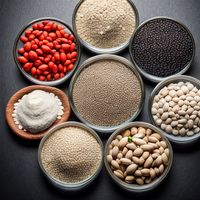A recent observational study suggests that consuming a minimum of five small portions of dark chocolate weekly could potentially reduce the likelihood of developing type 2 diabetes by 21%. Intriguingly, the study indicates that the benefits escalate as the frequency of dark chocolate consumption increases, from none to five servings.
However, before indulging in an entire bar, it's crucial to note that a serving size is equivalent to 1 ounce, and only dark chocolate has been linked to these health benefits—milk chocolate enthusiasts may be disappointed. The research revealed that milk chocolate consumption was associated with weight gain over time, a significant factor in the onset of type 2 diabetes.
"Although dark and milk chocolate contain similar levels of added sugar, fat, and calories, the key distinction is that dark chocolate is richer in cacao," explained Binkai Liu, the lead author and a doctoral student in the Department of Nutrition at Harvard T.H. Chan School of Public Health. Cacao, derived from the Theobroma cacao tree, is chocolate in its raw and less-processed state. It is known for its high flavanol content, with the percentage of cacao on the label of a dark chocolate bar directly correlating to its flavanol content. Flavanols function as antioxidants and mitigate inflammation, which can precipitate or exacerbate chronic conditions like heart disease and diabetes.
While the study does not establish a direct cause-and-effect relationship, it is hypothesized that the elevated flavanol levels in cacao might account for the divergent effects observed between dark and milk chocolate. Dr. Nestoras Mathioudakis, co-medical director of the Diabetes Prevention and Education Program at Johns Hopkins Medicine in Baltimore, elaborated, "The bioactive compounds in cacao, known as flavanols, have demonstrated in animal studies and small-scale human trials the ability to enhance insulin sensitivity and decrease oxidative stress and inflammation, all of which are integral to the development of diabetes." He continued, "Thus, it is plausible that the high flavonoid content in dark chocolate could exert positive health effects."
Approximately 10% of Americans are estimated to have diabetes, with up to 95% of those cases being type 2, as per the US Centers for Disease Control and Prevention. On a global scale, the situation is more dire—with a July 2023 study projecting at least 1.31 billion diabetes cases by 2050, a significant increase from 529 million in 2021. Factors contributing to this trend include reduced physical activity, alcohol and tobacco consumption, and poor dietary habits, particularly an overreliance on ultraprocessed foods. A September observational study found that for every 10% increase in ultraprocessed food intake, the risk of developing type 2 diabetes rose by 17%.
While chocolate can be classified as an ultraprocessed food, should doctors recommend chocolate consumption, even dark chocolate, to those at risk of type 2 diabetes? Dr. Mathioudakis clarified, "Given that chocolate products are candy and contain sugar, I do not advocate for their consumption for improved glucose control, nor am I convinced by this study alone." He suggested alternative sources, particularly dark berries such as blueberries, blackberries, and pomegranates, apples, and tea. "Red wine also contains flavanols, but I would not advise its consumption either."
The study, published in The BMJ journal, drew data from three long-term studies: the Nurses’ Health Study, the Nurses’ Health Study II, and the Health Professionals Follow-Up Study. Participants completed food questionnaires every four years over a 25-year period. Researchers analyzed the consumption of dark chocolate, milk chocolate, and total chocolate among over 111,000 chocolate enthusiasts.
After adjusting for dietary and lifestyle risk factors, they discovered that those who consumed at least five 1-ounce servings of any type of chocolate per week had a significantly lower rate of type 2 diabetes—10% less—compared to those who rarely or never consumed chocolate. However, when considering the type of chocolate, milk chocolate did not show a significant reduction in diabetes risk. In contrast, individuals who ate at least five servings of dark chocolate weekly exhibited a significant 21% lower risk of type 2 diabetes and did not experience the long-term weight gain associated with milk chocolate.
The study, however, has its limitations, as the authors acknowledge. The study population consisted primarily of older White adults, and chocolate consumption was relatively low. Additionally, the results contradict a December 2023 study that found no benefits for diabetes in cocoa consumption. Dr. Mathioudakis noted, "The authors themselves reference a large, randomized controlled trial that provided 21,000 individuals with 500 milligrams of cocoa flavanols, which reduced the risk of death but not the risk of diabetes." He added, "Further randomized controlled clinical trials are necessary to clarify these discrepancies."
Another concern raised by Dr. Mathioudakis is the contamination of dark chocolate and similar cocoa products with lead and cadmium, two neurotoxic metals linked to cancer, chronic disease, and reproductive and developmental issues, particularly in children. Organic dark chocolate has been found to contain some of the highest levels, likely due to industrial pollution in developing countries where cacao trees are cultivated.
In conclusion, Dr. Mathioudakis advised, "If you are not a fan of chocolate, it is probably best to opt for fruit and vegetable sources of flavonoids and avoid candy altogether." For those who cannot forgo chocolate, he suggested limiting consumption to 1 ounce of dark chocolate a few times a week. Liu emphasized, "For anyone who loves chocolate, this study serves as a reminder that making small choices, such as selecting dark chocolate over milk chocolate, can positively impact their health."

By Daniel Scott/Dec 13, 2024

By John Smith/Dec 13, 2024

By Lily Simpson/Dec 13, 2024

By Victoria Gonzalez/Dec 13, 2024

By Emily Johnson/Dec 13, 2024

By George Bailey/Dec 10, 2024

By Emily Johnson/Dec 10, 2024

By Samuel Cooper/Dec 10, 2024

By Olivia Reed/Dec 10, 2024

By Michael Brown/Dec 10, 2024

By Daniel Scott/Dec 9, 2024

By Grace Cox/Dec 9, 2024

By Olivia Reed/Dec 9, 2024

By Ryan Martin/Dec 9, 2024

By Joshua Howard/Dec 9, 2024

By Lily Simpson/Dec 9, 2024

By William Miller/Dec 9, 2024

By James Moore/Dec 9, 2024

By Eric Ward/Dec 9, 2024

By Samuel Cooper/Dec 9, 2024